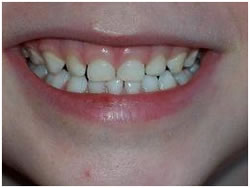Tooth Grinding
 1. Why do kids grind their teeth? Does the answer change depending on the age of the child?
1. Why do kids grind their teeth? Does the answer change depending on the age of the child?
Children exhibit teeth grinding very commonly. We see it in children younger than 7-8 years old often. A lot of children will stop grinding once their six-year permanent molars erupt. Their permanent teeth bite begins to establish itself once those molars erupt.
Prior to this, children's bites are very flexible and subject to changes as they grow. Occasionally, children will exhibit an abnormal bite causing them to grind because of the placement of their teeth.
2. Could it be stress-related? Do children grind their teeth for some of the same reasons adults might grind their teeth?
More common is stress related grinding in students of middle school age and high school when (final exams and other) major testing occurs. This is the stress more common to this age group.
3. What should parents do if their child is grinding his or her teeth?
If the child is still very young with baby teeth still present, nothing needs to be done as we do not want to affect their growth. If the child is older, intervention may be necessary. The plan is to protect the permanent teeth while not negatively affecting their normal growth.
4. What should they look out for? When should parents worry?
Pediatric Dentist will notice and track wear patterns and recommend treatment when appropriate.
5. How common is teeth-grinding?
It is very common in children less than 7 years of age. There are adults that do this so not all children outgrow grinding. According to some studies, there is also a correlation between children grinding their teeth and those children that have sleeping disorders.
6. Any other tips for parents who are concerned about their children's teeth-grinding issue?
Our major concern is that permanent teeth are not affected and normal growth is allowed to occur. Many children do this and this does not mean that they are stressed, rather sometimes this is a natural expression of frustration until their vocabulary increases and they can verbally express their frustrations. In most cases this is a subconscious response and will change with age and growth.
Sources
Rhea Haugseth, a pediatric dentist and president-elect of the AAPD
Bell RA, Dean JA, McDonald RE, Avery DR. Managing the developing occlusion. In: Dean JA, Avery DR, McDonald RE. Dentistry for the child and adolescent. St. Louis, Mosby Elsevier, 9th ed., 2011, p: 550-613.





